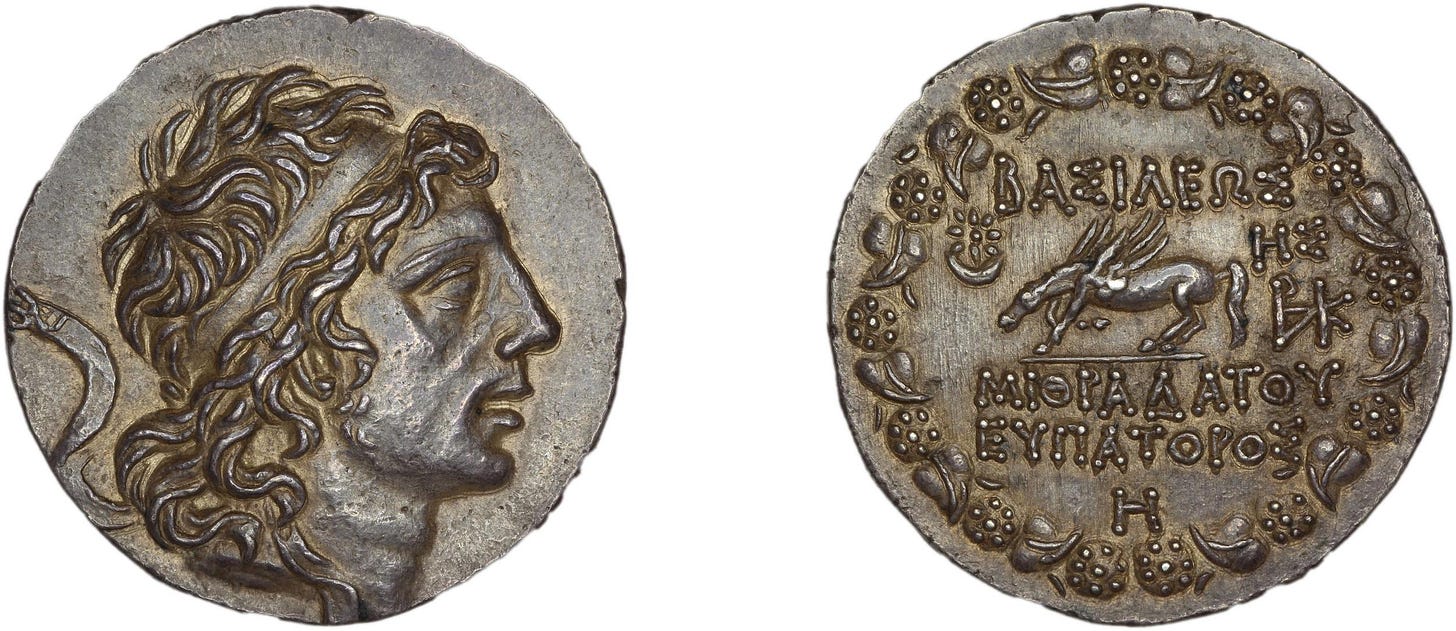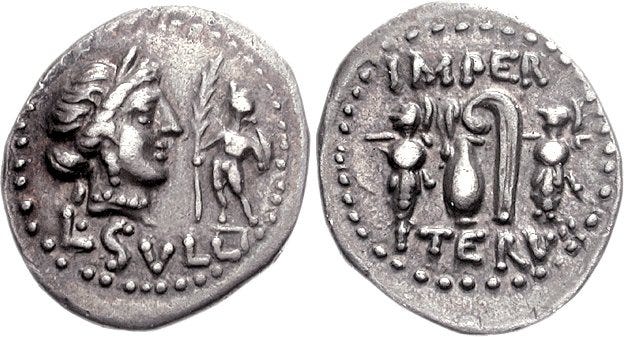Lucius Cornelius Sulla Felix ("Sulla") was born into a patrician family, gens Cornelia, in 138 BC when the branch had lost most of its power due to the unfortunate circumstances of its predecesors. Sulla, however, was known to have had a knowledge of Greek and Latin literature equal to that of the best scholars of the time. Roman historian Sallust described Sulla as, "eloquent, shrewd, and an accommodating friend. His skill in pretence was such that no one could penetrate the depths of his mind: but he was a generous giver, especially of money." These characteristics would serve Sulla until the end of his career.
Portrait of Sulla on a denarius (54 BC) minted by his grandson Pompeius Rufus
Sulla had proved his military competence during the Social War of 90 BC and was favoured by the Senate. As a result he was elected consul for 88 BC, granted the Roman province of Asia and the command against Mithridates (the King of Pontus) for the following year. During Sulla's time fighting in the Mithridatic War, a group of Populares (the opposing faction of the Optimates, consisting of members in favour of the Plebians) ruled Rome and continually tried to undermine Sulla's attempt to restore traditional laws and values in Rome and his attempts to strengthen the Senate.
Portrait of Mithridates VI in diadem with Pegasus drinking (90 BC)
Sulla had every reason to distrust the Populares, primarily led by Cinna and Marius, known for his Marian Reforms. Cinna attempted to undermine the existing order of things by registering all thirty-five tribes around Rome as "new citizens", whereas Sulla wanted to restrict this to but a few. One of the ruling consuls, Octavius, followed the Optimate's position of restricting them to just a few. This issue once again led to rioting in the Forum and Cinna was driven out of Rome by Octavius and the Optimates. He was deprived of his consulship and declared a public enemy.
That same year, Sulla appealed to his army to support him as consul in restoring order, and with six legions behind him he marched on Rome. This was a momentus event in Rome's history because armed troops were not permitted to enter the city (except to celebrate a triumph) and no commander with imperium was allowed within the ritually consecrated city boundary. Marius and Sulpicius (an ally of Marius) had no army to defend themselves and were forced to flee the city along with the rest of the Populares. Sulla then strengthened the power of the Senate and reinstated a lot of Rome's traditional laws before leaving to fight Mithridates from 87-84 BC.
Reverse of a denarius depicting Gaius Marius as triumphator in a chariot (101 BC)
Sulla returned to Rome in 83 BC which was the start of a year long civil war. Before Sulla left the east he warned the Senate in an official letter that he was returning to punish those who had committed crimes against him (the details of the civil war can be read in Appian's "The Civil Wars").
After the final battle of the civil war, Sulla entered Rome as its master and very first dictator. He had successfully taken Rome by force and had started to reinstate a lot of traditional reforms to Rome's legislature. By this point, Sulla had now devoted himself to the work of butchery as described by Plutarch and Appian in regards to the Proscriptions of Sulla:
"Then immediately, and without consulting any magistrate, Sulla published a list of eighty men to be condemned. Public opinion was horrified, but after a single day's interval, he published another list containing 220 more names, and the next day a third list with the same number of names on it... some of these, taken unaware, were killed where they were caught, in their houses, in the streets, or in the temples... there was much massacre among those Italians who had obeyed Carbo or Marius."
Sulla now believed that the only way to restore order to the turbulent Late Republic was to revive the dictatorship. In a letter to the Senate he suggested that since the consuls were dead, it should appoint an interrex for the sole purpose of restoring the republic (republicae constituendae).
Sulla's aims were to strengthen the senate, restrict powers of the tribunes, curb independence of magistrates, avoid dangers from proconsuls, reorganise the courts and juries and to restore traditional Roman laws. The Senate, as a consequence, was enlarged by 300 new members from predominantly good equestrian families. Additionally, the Senate's approval was necessary before legislation was presented to the people, and their right to veto was limited.
Coin struck by military mint travelling with Sulla (83 BC). Obverse: Cupid with palm branch, Venus, referring to Sulla's belief that he was under the protection of Venus, who granted him victory in the battle against Mithradates. Reverse: Battle trophies of Chaeronea and Orchomenos. Capis and Lituus symbols of the augurate.
Although Sulla is one of the outstanding figures in Roman history, restoring a lot of tradition in a turbulent, progressive Rome, he was an enigma to many of his contemporaries. He followed a career of self-advancement, reaching a point where his authority was so complete that he had imperium over all magistrates and promagistrates in his position as dictator. He even anticipated the future later emperors by keeping a bodyguard and striking coins with his own image. Yet as soon as he had reorganised the government in 79 BC, he laid down his dictatorship and gave back to the people the right of electing consuls.
Appian believed that Sulla had retired from public life, "because he was weary of war, weary of power, weary of Rome." Many of the Optimates were happy with Sulla's attempts at restoring traditional values and laws to Rome. He passed away one year after retirement in 78 BC.
Laureate head of Italia left, helmeted soldier right (89 BC)









Successful work sire.